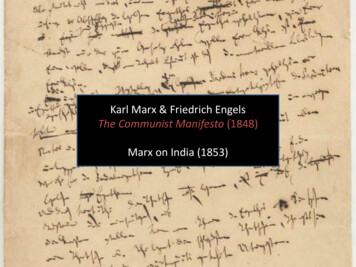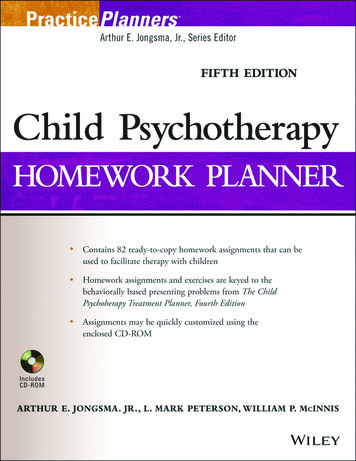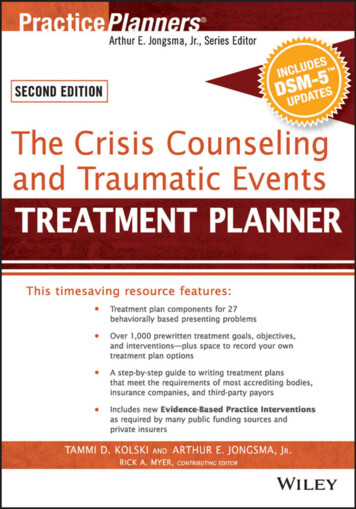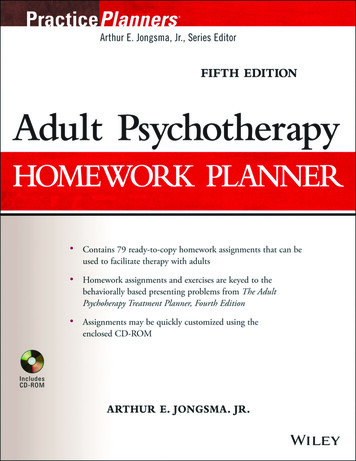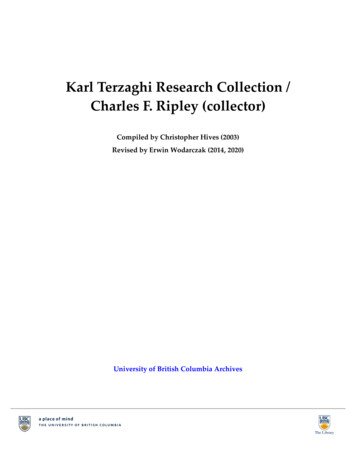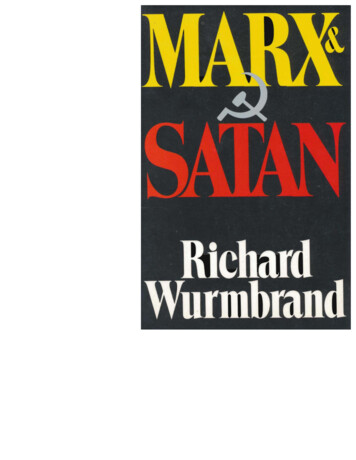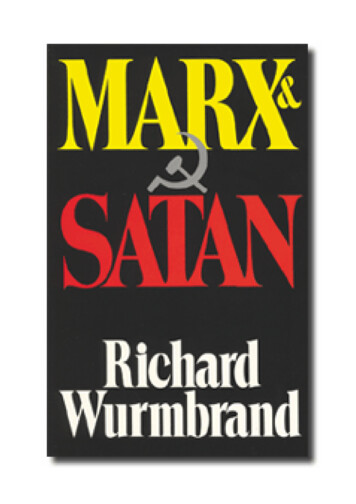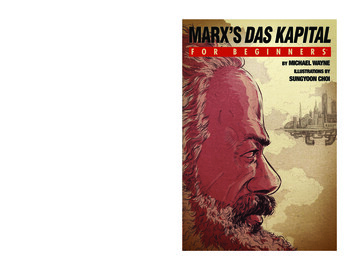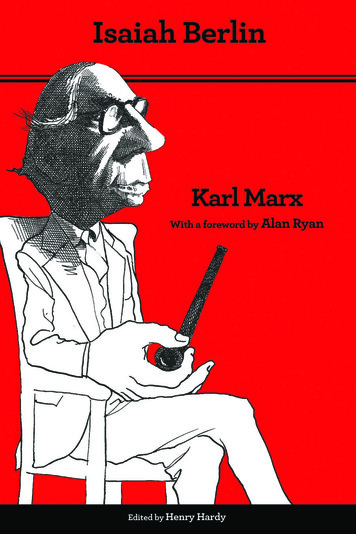
Transcription
Karl MarxIsaiah Berlin was born in Riga, now capital of Latvia, in1909. When he was six, his family moved to Russia; there in 1917,in Petrograd, he witnessed both revolutions – social democraticand Bolshevik. In 1921 he and his parents came to England, andhe was educated at St Paul’s School, London, and Corpus ChristiCollege, Oxford.At Oxford he was a Fellow of All Souls, a Fellow of NewCollege, Professor of Social and Political Theory, and founding President of Wolfson College. He also held the Presidencyof the British Academy. In addition to Karl Marx, his mainpublished works are Russian Thinkers, Concepts and Categories,Against the Current, Personal Impressions, The Crooked Timberof Humanity, The Sense of Reality, The Proper Study of Mankind,The Roots of Romanticism, The Power of Ideas, Three Critics ofthe Enlightenment, Freedom and Its Betrayal, Liberty, The SovietMind and Political Ideas in the Romantic Age. As an exponentof the history of ideas he was awarded the Erasmus, Lippincottand Agnelli Prizes; he also received the Jerusalem Prize for hislifelong defence of civil liberties. He died in 1997.Henry Hardy, a Fellow of Wolfson College, Oxford, is one ofIsaiah Berlin’s Literary Trustees. He has edited (or co-edited)many other books by Berlin, including all those listed above,and is currently working on the fourth and final volume of hisselected letters.
Terrell Carver is Professor of Political Theory at the Universityof Bristol. His extensive publications on Marx and Engelsinclude the Oxford Very Short Introduction to Engels, his owntranslations of Marx’s Later Political Writings, and a thematicreappraisal of Marx’s thought in The Postmodern Marx.For further information about Isaiah Berlin visit‹http://berlin.wolf.ox.ac.uk/›
Also by Isaiah Berlin*The Hedgehog and the FoxThe Age of EnlightenmentRussian ThinkersConcepts and CategoriesAgainst the CurrentPersonal ImpressionsThe Crooked Timber of HumanityThe Sense of RealityThe Proper Study of MankindThe Roots of RomanticismThe Power of IdeasThree Critics of the EnlightenmentFreedom and Its BetrayalLibertyThe Soviet MindPolitical Ideas in the Romantic Agewith Beata Polanowska-SygulskaUnfinished Dialogue*Flourishing: Letters 1928– 1946Enlightening: Letters 1946– 1960Building: Letters 1960– 1975
KARL MARX Isaiah BerlinFifth EditionEdited by Henry HardyForeword by Alan RyanAfterword andGuide to Further Readingby Terrell CarverPrinceton University PressPrinceton and Oxford
Published in the United States of America, its territories, dependencies,and the Philippine Islands by Princeton University Press, 41 WilliamStreet, Princeton, New Jersey 08540Requests for permission to reproduce material from this work should besent to Permissions, Princeton University Press.press.princeton.eduCopyright Isaiah Berlin 1939, 1948 Isaiah Berlin 1960, 1963, 1978 The Isaiah Berlin Literary Trust and Henry Hardy 2013Foreword Alan Ryan 1995, 2013Afterword Terrell Carver 2007, 2013Guide to Further Reading Terrell Carver 2013Editorial matter Henry Hardy 2013First edition published in the Home University Libraryby Thornton Butterworth 1939Second Edition published by Oxford University Press 1948Reprinted with additions 1960Third edition 1963Fourth edition 1978Fifth edition published by Princeton University Press 2013The moral right of Isaiah Berlin and Henry Hardy to be identified as theauthor and editor respectively of this work has been asserted.All Rights ReservedLibrary of Congress Cataloging-in-Publication DataBerlin, Isaiah, 1909–1997.Karl Marx / Isaiah Berlin; edited by Henry Hardy; foreword byAlan Ryan; afterword and Guide to Further Reading by Terrell Carver. –Fifth edition.pages cmIncludes bibliographical references and index.ISBN-13: 978-0-691-15650-7 (pbk.: alk. paper)ISBN-10: 0-691-15650-6 (pbk. : alk. paper)1. Marx, Karl, 1818–1883. 2. Communists – Biography.I. Hardy, Henry. II. Title.HX39.5.B4 2013335.4092–dc23 2012051126[B]British Library Cataloging-in-Publication Data is availableThis book has been composed in Garamond Premier ProPrinted on acid-free paper Printed in the United States of America1 3 5 7 9 10 8 6 4 2
To the memory of Marie and Mendel Berlin
ContentsEditor’s Preface to the Fifth Edition Foreword by Alan Ryan Preface to the Fourth Edition xixixxxixNote to the Third Edition xxxiiiNote to the First Edition xxxv1 Introduction 12 Childhood and Adolescence 223 The Philosophy of ‘The Spirit’ 334 The Young Hegelians 575 Paris 766 Historical Materialism 1127 1848 1498 Exile in London: The First Phase 1689 The International 20510 ‘The Red Terror Doctor’ 22011 Last Years 248Afterword by Terrell Carver 267Guide to Further Reading by Terrell Carver 291Index 297
Editor’s Preface to the Fifth EditionThe author’s admirable ability to translate many abstruseand obscure notions of Marxism into a clear languageand his virtuosity in showing connections betweenpersonalities, characters, attitudes on the one hand anddoctrinal issues on the other are unparalleled in theexisting literature.Leszek Kołakowski1iIsaiah Berlin’s intellectual biography of Karl Marx,first published in 1939, has long been recognised as one of thevery best concise accounts of the life and thought of a man whosedoctrines Berlin described in the closing words of the book as‘the most powerful among the intellectual forces which aretoday permanently transforming the ways in which men act andthink’. With his celebrated genius for empathising with thosewhose views he does not share, Berlin enters into the mind of hissubject and shows us the view from within:2 without jargon, andEndorsement for the fourth edition, 1978.This ventriloquistic gift of Berlin’s left his readers unclear, not for thefirst time, about where exactly the boundary lay between the exposition of hissubject’s views and his expression of his own. On 29 October 1939, shortly afterthe book was published, Berlin’s friend Mary Fisher wrote to her friend FloraRussell: ‘Did I tell you that last Sunday Corinne & I met Mr & Mrs Berlinpère et mère & Mrs. B. was brought to confess that every weekend Mr. B. readsthe book aloud to her – & she at intervals interrupts to say “Is that Marx or is12
xii Henry Hardywithout the obscurity of much of Marx’s own prose, he presentsand explains Marx’s ideas, their origins and their power.Reviewers of the first edition immediately perceived thebook’s virtues. The historian of Russia Richard Charques calledit ‘a model of objective clarity’.1 The British historian A. L. Rowsewrote: ‘Berlin’s attitude to his subject is exemplary, and on thewhole it is the best introduction to it that we have. [. . .] The greatquality of the book is its absence of parti pris and its completelyimpartial and objective approach. In consequence it makes Marxintelligible, both as a person and as a thinker; and without anyundue admiration.’2Forty years on and more the verdict was unchanged, asexemplified by the judgement of Leszek Kołakowski – oneof the foremost twentieth-century authorities on Marx andMarxism – quoted above. Moreover, as Alan Ryan and TerrellCarver explain in the essays included in this new edition (thefirst for thirty-five years), Berlin’s account has remained freshand convincing to this day, remarkably unaffected – not leastbecause of the detachment praised by the reviewers – by thetorrent of scholarship about Marx that has appeared since it wasfirst written.iiThe book, then, is still very much alive, and shows no signs ofbeing superseded as one of the most successful introductions toit Shaya? [familiar form of ‘Isaiah’]” & he reassures her “No no – that is onlyMarx: it is not Shaya”?’1R. D. Charques, ‘In the name of Marx’, The Times Literary Supplement, 7October 1939, 570. He also wrote: ‘One could wish that Mr Berlin had a tastefor shorter sentences, but on the other hand it must be said that his elaborateand almost neo-Augustan precision of style is not without charm.’2Political Quarterly 11 no. 1 ( January 1940), 127–30 at 128.
Editor’s Preface to the Fifth Edition xiiia crucially important but notoriously difficult subject. However,even after the appearance of four successive editions prepared bythe author over a period of more than forty years, there remainedsome not insignificant problems in the text which needed to beresolved. In order to explain what I mean by this I need to bebriefly autobiographical.The previous edition of the book appeared in 1978. I wasthe editor at Oxford University Press responsible for overseeing the publication of that edition, and I was also then in themidst of editing (not under my OUP hat) the four collectionsof Berlin’s essays, originally published under the collective seriestitle Selected Writings, that began my still continuing work on histexts. It was not part of my task at that time to give Karl Marxthe attention all his work needed in order to turn – in his owncharacteristically but absurdly self-deprecating phrase – ‘whatwere mere belles-lettres into scholarship’.1 But I knew from myexperience with his other writings that this need existed, and itwas then that I became aware that one day this text, too, shouldbe attended to in this spirit. The quotations were unreferenced,sometimes misattributed, and often somewhat approximate orworse, starting with the opening epigraph from Joseph Butler,which contained at least three infidelities in twenty-three words.The punctuation was often erratic, and there were numerousother minor blemishes of form and substance that ought tohave been spotted by the previous publishers, and were ripe forelimination.I do not wish to exaggerate: this is still very much the samebook. But lest the flaws I have alluded to should be thoughtmerely trivial, let me give an (admittedly extreme) example whichreveals how unreliable Berlin’s scholarship could be. Even if thisunreliability rarely made what he wrote seriously misleading, andQuoted in a letter from Pat Utechin, Berlin’s secretary, to Henry Hardy,12 December 1997.1
xiv Henry Hardyeven if in some cases his errors may be thought venial when thecomparatively impoverished bibliographical and technologicalconditions in which he worked are borne in mind (let alone thesomewhat loose scholarly standards that prevailed in the 1930s),1it cannot be denied that (like Marx and Engels themselves) heoften failed to ensure that his quotations and (where he suppliedthem) his references were accurate.In previous editions of the book, the paragraph on page 257of the present volume beginning ‘This English exceptionalism’reads as follows:‘In England’, he wrote, ‘prolonged prosperity has demoralisedthe workers . . . the ultimate aim of this most bourgeois of landswould seem to be the establishment of a bourgeois aristocracyand a bourgeois proletariat side by side with the bourgeoisie . . .the revolutionary energy of the British workers has oozed away. . . it will take long before they can shake off their bourgeoisinfection . . . they totally lack the mettle of the old Chartists.’2Here Berlin presents these passages as drawn from the same text(not specifying its identity, its recipient or its date). In fact, asmay be seen on page 257, each of the five passages separated byellipses comes from a different letter, three from Engels to Marx,two from Marx to Engels, covering between them a period ofmore than a decade. Credit where credit is due: Berlin (presumably) brought these passages together from different sourcesand saw what they had in common and what they revealed. Butcensure where censure is due, too: perhaps in this case nothingof importance stands or falls by this kind of scholarly sloppiness,but it deserves to be put right, if only as a matter of principle.1On these cf. (mutatis mutandis) my note on eighteenth-century referencesin my edition of Berlin’s The Roots of Romanticism, 2nd ed. (Princeton, 2013),xxv/2.2KM1 (269/1) 241–2.
Editor’s Preface to the Fifth Edition xviiiThe resetting and reissue of the book by Princeton UniversityPress in this new fifth edition has provided the opportunity andthe stimulus finally to put the necessary work of correction andreferencing in hand. The publication of improved editions ofmany of the works Berlin quotes (not to mention the transforming effect of the internet on scholarship) has made it easier toensure increased faithfulness to the original texts, some of which,indeed, were written in English but back-translated by Berlinfrom editions in other languages – the only ones available whenhe was writing. In addition, the completion of the Englishlanguage edition of the Collected Works of Marx and Engels,available both in print and online (see page 292 below), makespossible a single method of referencing quotations from thoseauthors, by volume and page (thus: CW 20: 45).1Berlin often translates somewhat creatively. Where his versionis not unreasonably inaccurate, it has usually not been alteredto bring it into line with that in CW; where it is demonstrably erroneous, or where a different translation has become iconic,the version in CW has normally been used.Terrell Carver’s expert knowledge of most of the texts quotedby Berlin speeded up the process of identification, referencing,checking and correction, and I am greatly in his debt for his alwayscheerful and efficient help. I am also grateful to him for updatinghis guide to further reading, and for allowing me to include, as anafterword, a slightly revised version of the essay first published as‘Berlin’s Karl Marx’ in George Crowder and Henry Hardy (eds),The One and the Many: Reading Isaiah Berlin (New York, 2007).1CW, despite its title, is not complete, but Berlin did not use materialby Marx or Engels excluded from it. (Any attempt to distinguish separatelypublished works from articles in journals etc. founders on a broad reef ofpenumbral cases: so almost all titles of items in CW are given in italics.)
xvi Henry HardyMy thanks are also due to other colleagues and scholars whohelped me with individual points: Shlomo Avineri, Al Bertrand,John Callow, Joshua L. Cherniss, Georgina Edwards, SteffenGroß, Nick Hall, Jürgen Herres, Helen O’Neill, Ulrich Pagel,Tatiana Pozdnyakova, Jürgen Rojahn, Norman Solomon, SimonToubeau and Josephine von Zitzewitz.The footnotes in this edition are editorial, except where theauthor relegated a comment to a note. It should be self-evidentwhich these authorial notes are, but, for the avoidance of doubt,editorial notes that go beyond the provision of bibliographicalreferences are enclosed in square brackets. Cross-references topages are by page number alone; those to notes are in the form‘123/4’, i.e. page 123, note 4.A number of drafts of the first edition of the book survive,as well as research notes, showing how the text developed on itsjourney to published form. One factor at play was the word limitset by the editors of the series in which it appeared – the HomeUniversity Library – which necessitated substantial cuts inBerlin’s original text.1 Towards the end of his process of revisionhe wrote to his friend Cressida Bonham Carter: ‘I must finish K.Marx, of which now only 7000 words remain to be cut: it is anabsolutely hateful process, every evening I count up little dropsof blood & measure the cup: all the purple passages are gone, &now the turn of the facts has come, towards which I now feelvindictive & eliminate them gaily.’2Three more editions appeared in Berlin’s lifetime, thoughthe additions made in a reprint of 1960 (provided originally1The original contractual allowance was 50,000 words, increased in 1938 inresponse to Berlin’s pleas to 65,000 words. Berlin wrote over 100,000 words,which he cut to the published length of 75,000 words. Fisher had told him that‘squeezing the book into Home University format – from its original vastersize, which I pleaded for in 1936 – “would be the making of the book” ’ (IB,letter to Noel Annan, 31 August 1973).2Letter of 28 August 1938, in Isaiah Berlin, Flourishing: Letters 1928–1946,ed. Henry Hardy (London, 2004), 280.
Editor’s Preface to the Fifth Edition xviifor a 1959 German translation) would have made it more appropriate to call that a new edition than so to describe the onlyslightly amended 1948 text; but the transition from ThorntonButterworth to Oxford University Press in the latter year wasvery naturally so marked. Readers interested in the history of thetext, before and after its first publication, are invited to visit theIsaiah Berlin Virtual Library, where information on this topic isassembled, including a complete text of the first edition in whichmany of the cuts have been restored: see http://berlin.wolf.ox.ac.uk/published works/ .Berlin dedicated Karl Marx: His Life and Environment,1 as thebook has been called until now, to his parents, Marie and MendelBerlin, who gave him his own life and provided the environmentthat shaped him. This edition is dedicated to their memory.Heswall, August 2012h.h.I have dropped the subtitle from the present edition. It doesn’t comfortably fit a book so extensively devoted to its subject’s ideas, even if ‘environment’is understood in an intellectual sense. ‘Life and Opinions’, perhaps.1
ForewordAlan RyanKarl Marx was Isaiah Berlin’s first book. He was just thirtyyears old when it appeared. In Oxford and London he was alreadyknown as a dazzling conversationalist and a strikingly giftedyoung philosopher; but it was in Karl Marx that he first revealedhis special talent as a historian of ideas – the discipline in whichhe enthralled his readers for the rest of his writing life. That talentis, as such gifts often are, a talent that is easier to admire and enjoythan it is to describe; but it emerges as an astonishing ability to dojustice both to the thinker and the thought – to paint a pictureof the personalities of the men and women he writes about,without for a moment forgetting that we want to know aboutthem because of their ideas rather than their marital adventuresor their tastes in dress, and to make the picture vivid just because,although ideas have a life of their own, they are also stamped withthe characters of the men and women whose ideas they are.It is a talent that made Berlin’s essays on great ideas and greatmen a considerable art form. As readers of his collected essaysknow, Personal Impressions – the volume devoted to encounterswith his contemporaries, memorial addresses, and accounts ofthe greatness of the century’s great men – is hardly different intone and style from his Russian Thinkers or Against the Current –the companion volumes of essays in the history of ideas. It seemsalmost inconsequential that Berlin never talked to Turgenev ashe talked to Anna Akhmatova, that he never discussed the history of Florence with Machiavelli as he did discuss the history
xx Alan Ryanof eighteenth-century England with Lewis Namier. It has beensuggested that all serious thinkers inhabit an ‘invisible college’,where a silent conversation goes on between the living and theimmortal dead, and Plato is as present as the newest graduatestudent wrestling with his work. Berlin’s writing suggests theimage of something livelier and more spirited than most colleges, perhaps a vast intellectual soirée where the guests comefrom every social stratum and all possible political persuasions.Whatever one’s favourite metaphor, the effect is to bring all hissubjects fully and thoroughly to life.All the same, historians of ideas are not novelists, nor even biographers. Although Berlin gave Karl Marx the subtitle ‘HisLife and Environment’, it was Marx’s life as the theorist of thesocialist revolution that Berlin was chiefly concerned to describe,and the environment that Berlin was interested in was notso much the Trier of Marx’s boyhood or the North Londonof his years of exile, but the political and intellectual environment against which Marx wrote the Communist Manifestoand Capital. The moral of Karl Marx, however, must be takenas a comment on both Marxism and Marx himself; in his finalparagraph, Berlin observes:[Marxism] sets out to refute the proposition that ideas governthe course of history, but the very extent of its own influence onhuman affairs has weakened the force of its thesis. For in alteringthe hitherto prevailing view of the relation of the individual tohis environment and to his fellows, it has palpably altered thatrelation itself, and in consequence remains the most powerfulamong the intellectual forces which are today permanently altering the ways in which men think and act.Marxism, by way of the activities of the communist parties itinspired, turns out to be a cosmic philosophical joke against theman who created it. Marx was a theorist who argued that individuals were the playthings of vast and impersonal social forces;
Foreword xxibut as the inspiration of Lenin, Stalin and Mao Zedong, theindividual Marx was himself the originator of vast social forces.Marx argued that ideas were epiphenomena, the reflections ofsocial interests that they disguised and rationalised; but his ownideas changed the world – even if, ironically, it was in ways hewould mostly have deplored. Karl Marx offers its readers manypleasures, and not the least of them is the wry picture that Berlinpaints of the way its subject set in motion a historical drama thatcalled his whole life’s work into question.Berlin later argued at length against the doctrine of historicalinevitability, and against any attempt to make the study of history ‘scientific’ by evacuating it of moral and political concerns.Marx was the most obvious inspiration of these views duringthe 1930s and afterwards. While it is hard to believe that hisindignation against the capitalist order was fuelled by anythingother than a strong sense of justice, he frequently claimed thathis historical materialism superseded any ‘moralising’1 critique ofthe existing order, and Engels at any rate said of him that whathe had uncovered was the law of ‘development of human history’and the law of the ‘present-day capitalist mode of production’,2the laws that dictated the inevitable collapse of capitalism and itsreplacement by socialism.Berlin is neither the first nor the last critic of Marx to noticethat his professed indifference to moral considerations is hardto square with his evident hatred of the injustice and cruelty sovisible in the early years of the Industrial Revolution, and that hisassertion of the inevitability of the downfall of the capitalist orderwas equally hard to square with the way he sacrificed his healthand domestic happiness to promoting the revolutionary cause.What was distinctive about Berlin’s reaction to Marx is not thathe was affronted by these logical tensions and inconsistencies,12Moralising Criticism and Critical Morality (1847), CW 6: 318.Karl Marx’s Funeral (1883), CW 24: 467, 468.
xxii Alan Ryanbut that he spent the rest of his intellectual career thinkingand writing about their origins, about alternative visions of theworld, and about the contemporaries and successors to Marxwho thought about them too.Berlin’s Marx is an interesting figure because he was simultaneously so much a product of the Enlightenment, and so much aproduct of the Romantic revolt against the Enlightenment. Likethe French materialists of the eighteenth century, Marx believedin progress, believed that history was a linear process, not, as theancient world had thought, that it was a repetitive cycle of growthand decay; but, like critics of the Enlightenment such as Burke,Maistre and Hegel, he thought that social change had not occurredin the past and would not occur in the future merely because someenlightened persons could see that it would be more reasonableto behave in a different way. It was violent and irrational forceswhich brought about significant change, and the rationality of thewhole historical process was something we could understand onlyafter the event. His encounter with Marx seems to have inspiredBerlin to grapple with the anti-Enlightenment; he wrote afterwards at length about the anti-rationalist critics of revolutionaryand liberal projects, such as Herder, Maistre and Hamann.In much the same way, it was the people Marx slighted duringhis career who later came to interest Berlin particularly. MosesHess was the first person to appreciate Marx’s formidable energyand intelligence, but the kindest way Marx referred to Hesswas as a donkey.1 Berlin was intrigued by the fact that Hess sawsomething which Marx systematically refused to see – that thecondition of the Jews in modern Europe was impossible to resolve by the liberal recipe of assimilation – and thus became oneof the founders of the benign, liberal Zionism on which Berlinhas written so movingly.Marx to Engels, 15 May 1847, 25 January 1865, CW 38: 117, 42: 66. [Cf.Engels to Marx, 14 January 1848, CW 38: 153, where Engels refers to Hess as‘the donkey’.]1
Foreword xxiiiAgain, Marx was contemptuous of his contemporary andrival, the Russian anarchist Mikhail Bakunin; almost until theend of his life he regarded Russia as the home of every sort ofbackwardness and repression. The thought that there might be aroute to freedom and democracy that suited the Russian people’sRussianness as well as their ordinary humanity was one thatcould hardly find room in his mind; Marx’s detestation of whathe thought of as the Slav character was only part of the problem,the other being his contempt for all sentiments of nationalitythat did not more or less directly foster the advance of socialism.In the 1950s Berlin went on to reveal to English and Americanreaders the riches of nineteenth-century Russian populismand liberalism as represented by Alexander Herzen, VissarionBelinsky and Ivan Turgenev, and to argue something we needto remember today more than ever, that nationalism can be andhas been an ally of liberalism as well as the expression of atavisticand irrational allegiances that we should all be better off without.It is more than seventy years since the first edition of KarlMarx was published, and they have been tumultuous years. Thebook went to press shortly before the outbreak of the SecondWorld War; after that war, we saw forty years of cold war, followed by an uncertain peace in which hostility between two greatideological camps has given way to a coolish friendship betweengreat powers, and continuous low-level ethnic and nationalistconflict in the Balkans, the Trans-Caucasus and much of Africa.The book was published in London as Britain went to warwith Nazi Germany – and its author went to a dazzling careerin the British Embassy in Washington; it reappeared in successive editions in a very different world. The second edition waspublished soon after the war; by then the cold war was firmlyestablished, and the Soviet interpretation of Marxism was asrigid as ever. There was nothing in the work of apologists for theSoviet regime to make one think that Berlin’s emphasis on thedeterministic rigidity of Marx’s vision of history was excessive,
xxiv Alan Ryanand nothing to make one think that Marx’s materialism mighthave been less extreme than his disciples had suggested.By the time the third edition appeared in 1963, NikitaKhrushchev’s speech to the Twentieth Party Congress of 1956had taken the lid off Stalinism in front of a Russian audience; theHungarian Revolution had disillusioned British Communistsand had forced the much larger and more robust Communistparties of France and Italy to rethink their political and intellectual allegiances. This was when a new ‘humanist’ Marxism wasdiscovered (or perhaps one should say invented); attempts at arapprochement between left-wing Catholics and philosophicallysophisticated Marxists were a striking feature of the late 1950sand 1960s, and the thought that Marxism was essentially a religious faith could be seen as something of a compliment ratherthan a complaint. One of this movement’s fruits was ‘liberationtheology’, a phenomenon that would surely have been savagedby Marx himself, but another was the idea that the young Marxat any rate had been a more subtle and interesting moral critic ofcapitalist society than had been thought.A fourth edition of Karl Marx appeared in 1978. Even afterforty years it had worn extremely well, but in the previous twentyyears there had been a flood of work by writers on both sidesof the Atlantic that might have made any author reconsider hisformer views. Much of it was work of deep and dispassionatescholarship. Although many of Marx’s modern interpreterscontinued to admire Marx as the scourge of capitalism, manyothers were motivated by the challenge of knowing just whatMarx was after. The less simple-minded and the more sympathetic Marx appeared, the harder it was to give a clear accountof his thinking. Was there one Marx or two? Had he changed in1846 from a young Hegelian humanist and idealist to a scientificanti-humanist, as Louis Althusser claimed? Or was he rather acultural critic, a social analyst concerned with the alienated stateof the soul of man under capitalism? The popularity of such
Foreword xxvbooks as Herbert Marcuse’s One-Dimensional Man and Eros andCivilization suggested the rich vein of social criticism that mightbe mined by somehow reconciling Marx and Freud.The flood of scholarship in the 1960s and 1970s revealedsomething that a reader would guess from the sheer exuberanceof Berlin’s account, but which is not much emphasised in KarlMarx. For the half-way sympathetic reader, Marx offers in numer able enticements – as a voracious reader and a savage critic,who worked by testing his ideas against those of his predecessorsand opponents, Marx whets the modern reader’s curiosity aboutnineteenth-century economics, German philosophy, ancient history, the French revolutionary underground, and more. This hasits dangers; just as Marx increasingly became unable to finish anywork he started because he wanted to read everything ever written on the subjec
resolved. In order to explain what I mean by this I need to be briefly autobiographical. The previous edition of the book appeared in 1978. I was the editor at Oxford University Press responsible for oversee-ing the publication of that edition, and I was also then in the midst of editing (not under my OUP hat) the four collections

